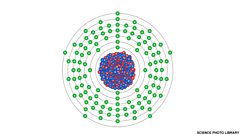Magnetism
Magnetic particles, galaxies and leaders. With physicist Stephen Blundell, astrophysicist Katherine Freese and advertising executive Richard Hytner.
Why can a small piece of metal have a better sense of direction than most people? Magnets have a myriad everyday uses, from compasses to radios, and yet for millennia we have struggled to understand their strange properties. Shedding light on magnetism on the sub-atomic scale is new research by physicist Stephen Blundell, astrophysicist Katherine Freese explains magnetism on a cosmic scale, and advertising executive Richard Hytner attempts to uncover the secrets of ‘magnetic’ personalities.
Photo: A magnet with iron filings (credit: Shan Pillay)
Last on
Clip
-
![]()
WIMPs versus MACHOs
Duration: 01:11
Chapters
-
Stephen Blundell
New insights into magnetism
Duration: 05:16
Katherine Freese
Magnetars: 100 trillion times more powerful than your fridge magnet
Duration: 10:27
60 Second Idea
How to make science data more visible
Duration: 03:58
Richard Hytner
Secrets of the ‘magnetic’ leader
Duration: 13:00
Stephen Blundell
![Stephen Blundell]()
Stephen Blundell is a Professor of Physics at the University of Oxford. He was the previous head of Condensed Matter Physics at Oxford, and is also a Professorial Fellow of Mansfield College, Oxford. His research is concerned with using muon-spin rotation and magnetoresistance techniques to study a range of organic and inorganic materials, particularly those showing interesting magnetic, superconducting, or dynamical properties. He is the author of Magnetism, A Very Short Introduction.
Katherine Freese
![Katherine Freese]() Katherine Freese is Director of Nordita, the Institute for Theoretical Physics of the Nordic countries in Stockholm, as well as the George E. Uhlenbeck Professor of Physics at the University of Michigan. She works on a wide range of topics in theoretical cosmology and astroparticle physics. She has been working to identify the dark matter and dark energy that permeate the universe as well as to build a successful model for the early universe immediately after the Big Bang. She is author of The Cosmic Cocktail: Three Parts Dark Matter.
Katherine Freese is Director of Nordita, the Institute for Theoretical Physics of the Nordic countries in Stockholm, as well as the George E. Uhlenbeck Professor of Physics at the University of Michigan. She works on a wide range of topics in theoretical cosmology and astroparticle physics. She has been working to identify the dark matter and dark energy that permeate the universe as well as to build a successful model for the early universe immediately after the Big Bang. She is author of The Cosmic Cocktail: Three Parts Dark Matter.Richard Hytner
![Richard Hytner]()
Richard Hytner joined Saatchi & Saatchi in 2003 as its CEO for Europe, Middle East and Africa. Today, as deputy chairman, he is responsible for global strategy and innovation and works with leaders and teams from many of Saatchi & Saatchi’s worldwide clients. Richard is adjunct associate Professor of Marketing at the London Business School, where he graduated as a Sloan Fellow in 2003. He is the author of Consiglieri: Leading from the Shadows.
Sixty Second Idea to Change the World
![Sixty Second Idea to Change the World]()
Stephen Blundell wants to introduce public display boards of current scientific data to encourage more numeracy and greater interest in science. So, in railway stations and bus stops, public squares and doctors’ waiting rooms, let’s have display boards with not only the usual details of time and ambient temperature but also barometric pressure, background radiation, current solar flux, the value of the Earth’s magnetic field and others. If people got used to seeing lots of these numbers, it would remind them that there are many important physical processes going on constantly around us, even if we can’t see them.
Photo credit: Shan PillayBroadcasts
- Mon 20 Apr 2015 01:05GMT���˿��� World Service Online
- Tue 21 Apr 2015 08:05GMT���˿��� World Service Online
Podcast
-
![]()
The Forum
The programme that explains the present by exploring the past







